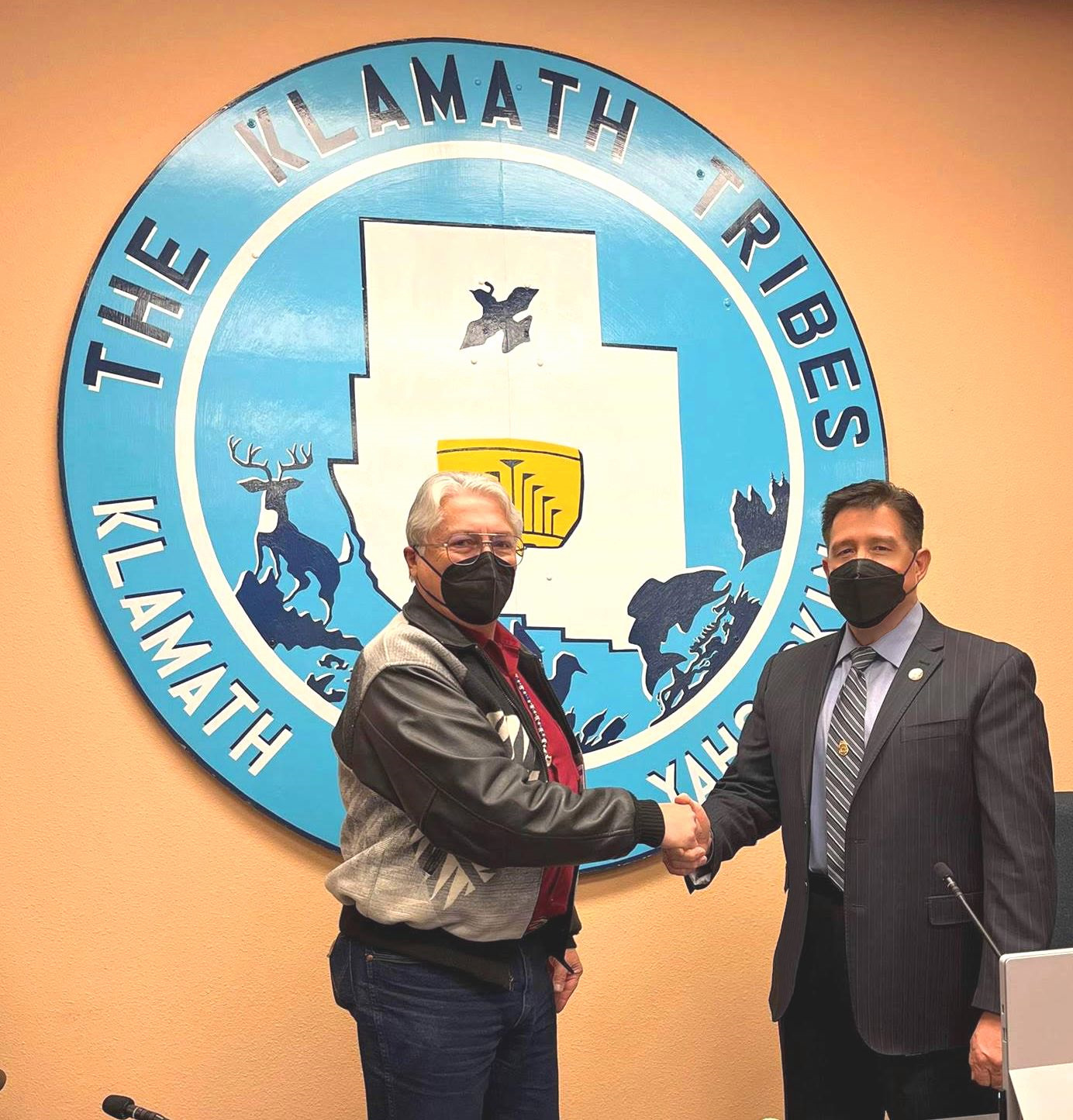Contact Us
To provide feedback on the Community Policing Dispatch, e-mail the editorial board at CPDispatch@usdoj.gov.
To obtain details on COPS Office programs, publications, and resources, contact the COPS Office Response Center at 800-421-6770 or AskCopsRC@usdoj.gov

U.S. Department of Justice
Office of Community Oriented Policing Services
Washington, DC 20530
Background of the Klamath Tribes
The Klamath Tribes comprise three tribes—the Klamath, Modoc, and Yahooskin Bands of Snake Indians—in southern Oregon. Following federal Indian Termination Policy, Congress terminated the Klamath Tribes under H. Con. Res. 108 on August 13, 1954. After 32 years of persistent lobbying by Klamath tribal leaders, the Klamath Tribes were restored to federal recognition through P.L. 99–398, the Klamath Indian Tribe Restoration Act, in 1986. The Tribes also obtained the return of a small portion of the original treaty-reserved land base, and many members live in neighboring jurisdictions. The Klamath Tribes' homeland in southern Oregon once encompassed more than 20 million acres.
The Klamath Tribes do not have a tribal police department, so the Klamath County (Oregon) Sheriff's Office provides law enforcement services for the Klamath Tribes. However, they intend to build and operate a Klamath Tribes Public Safety Department. The Klamath Tribes initially began developing the department in 2011 after Oregon legislators enacted Senate Bill 412, which recognizes tribal officers as state officers. In 2019, the Klamath Tribes sought to accomplish this development but realized the prospective tribal police department will have to navigate complex jurisdictional parameters and limitations including those established under federal, tribal, and—in certain instances of off-reservation conduct—state law. To be successful, the tribal police department will need continued buy-in and ongoing support from the Tribal Council, the Tribal members, and non-tribal jurisdiction stakeholders.
CRI-TAC Technical Assistance Overview
In 2019, the Klamath Tribes approached the Collaborative Reform Initiative Technical Assistance Center (CRI-TAC) with a request for resources and technical assistance to create a tribal police department that is sustainable and designed for the uniqueness of the Klamath Tribes. By working with CRI-TAC, the Klamath Tribes received support from a team of subject matter experts (SME) with Indian Country policing experience, a background of tribal police chief experience in the state of Oregon, and Native American representation. The SMEs provided guidance about promising practices for establishing a tribal police department and engaging the Tribal members in a meaningful way to encourage and maintain community buy-in. Throughout the engagement, the SMEs provided several topical briefing presentations:
- Jurisdictional Authority
- Public Law 280
- Senate Bill 412 and Senate Bill 343
- Community Policing Strategy
- Gap Analysis Process
- Policy and Procedure
The technical assistance culminated in a briefing to outline the strategic milestones for effective implementation of a tribal police department. This presentation was provided to the Klamath Tribal Council and their General Council to ensure key stakeholders were educated to fully understand and support the plans and next steps required to effectively develop a tribal police department. The perspectives, experience, and expertise of the SME team added significant value to the strategic milestones discussion, which included guidance for the following:
- Identifying the long-term goals, priorities, and scope of police services
- Developing law enforcement policies
- Including and forming partnerships with community stakeholders
- Recruiting and hiring staff
- Accessing resources and budget management
- Establishing operational plans and schedules

The support, expertise, and guidance provided by CRI-TAC helped the Klamath Tribes progress toward their goal of developing a tribal police department. In December 2021, the Klamath Tribes welcomed veteran Chief Vernon Alvarez to lead the newly formed department. He has served as the Chief of Police for the Shoshone-Bannock Tribes, Muckleshoot Tribe of Washington, Confederated Tribes of the Colville Reservation of Washington, Pueblo of Isleta of New Mexico, and Confederated Bands and Tribes of the Yakama Nation. Chief Alvarez sees this position as an opportunity to use his public safety experience working with Tribal Governments to help the Klamath Tribes create a tribal police department. According to Chief Alvarez, the department is developing the operational infrastructure and researching the demographic and service needs through public meetings to gather feedback, concerns, and needs from the tribal membership.

The Klamath Tribes were also awarded funding through the COPS Office’s Tribal Resources Grant Program, which provides support for one officer’s salary and benefits for five years and is Purpose Area #1 of the U.S. Department of Justice (DOJ) Coordinated Tribal Assistance Solicitation (CTAS). The CTAS combines many of the DOJ’s existing Tribal Government–specific competitive solicitations into a single solicitation, requiring only one application from each tribe or tribal consortium. This approach reduces the number of applications required to access funds and provides federally recognized tribes, tribal consortia, and tribal designees the opportunity to develop a comprehensive approach to public safety and victimization issues. The Klamath Tribes will leverage the CTAS funding to support initial staffing for the department. Chief Alvarez plans to start with hiring two certified tribal police officers, two fish and game officers, an emergency manager, and an administrative assistant to form the department. As the department gains a foundation, the number of tribal police officers will expand to meet the service needs of the tribal membership.
About CRI-TAC: Solutions By the Field, For the Field
Every day, law enforcement agencies and the communities they serve face challenges. Some agencies struggle to meet drastically changing service demands, while others are unsure about how to allocate resources, incorporate promising practices, or spread the word about new programs. Some agencies are looking for new and effective ways to engage their communities. If you are a law enforcement executive looking for support, the CRI-TAC is here to help. Funded by the COPS Office, the CRI-TAC offers no-cost, customized solutions to law enforcement agencies throughout the United States. The solutions provided are tailored to the agency and informed by cutting-edge innovation and evidence-based and promising practices. To learn more about the CRI-TAC, download a brochure, or request assistance for your agency, visit the Collaborative Reform Initiative Technical Assistance Center website.
Vernon Alvarez
Chief of Police, Klamath Tribal Police Department
Willa Powless
Tribal Council Member at Large, The Klamath Tribes
Emily Jennings
Project Manager, International Association of Chiefs of Police
Photos courtesy of the Klamath Tribes.
Subscribe to Email Updates
To sign up for monthly updates or to access your subscriber preferences, please enter your email address in the Subscribe box.






